|
Because of the wide
variety of magic lanterns it is almost impossible to classify them in
categories. There will always be borderline cases and exceptions and we
always could class many of them under several groups. Besides many models were launched in several sizes and in that case we could classify the smaller ones as toy lanterns and the bigger ones as parlour lanterns. Nevertheless we will have a try. Toy lanterns or Children's lanterns. These magic lanterns have small dimensions, have a plain construction and were cheap. They originally were provided with a candle or a small oil lamp as source of light. They are only suitable for showing small magic lantern slides of about 2 till 4 cm wide. Parlour lanterns. These lanterns are already a bit larger, have a more solid construction and are consequently more expensive. Because of the larger and more dangerous oil lamps they must not be considered as a toy. Larger lanterns. The kind of magic lanterns that were used to present lectures in large rooms and for teaching students at schools or universities. Plural lanterns. These lanterns were mostly made of wood and brass and consisted of two or three single lanterns that were placed on top of each other or sometimes placed side by side. Thus amazing effects could be performed, like dissolving views. Special lanterns. By this we understand among other things the magic lanterns that are able to show not alone glass magic lantern slides, but also films or non-translucent cards or films, like the cinematographs and episcopes. Also remarkable lanterns like the lamposcope and the street lantern are classed here. Fancy lanterns. An exclusive category is build by magic lanterns that are not recognisable as a magic lantern at first sight because they are disguised as something else, like a Buddha, a mosque or an Eiffel tower. |
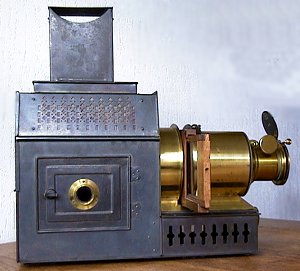 |
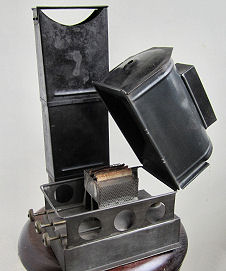 |
|
Large magic lantern made
of blued metal, the optical system and some other parts made of brass.
C. 1900, French, Laterne
Universelle C&G Paris. Sizes: long: 42 cm, wide 14 cm and tall (without chimney) 26 cm. The right photo shows the accompanying 3-wick oil lamp (opened) with its long chimney that consists of three parts and can be pulled out up to a length of 38 cm. |
||

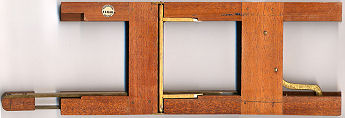 |
||
|
The magic lantern slides that
were used in those large magic lanterns mostly had the format 8.2 x 8.2
cm or 8.2 x 10 cm. Those slides could not be simply placed in the slide
holder of the lantern. A wooden slide carrier was needed to place the
slides and exchange them. The pictured carrier is the patented Eclips
self centring carrier, invented in 1886 and made by the Englishman
Robert Beard. The slides above are three slides from the set of
'Aesop's Fables' made by
Primus Junior Lecturers' Series. |
||
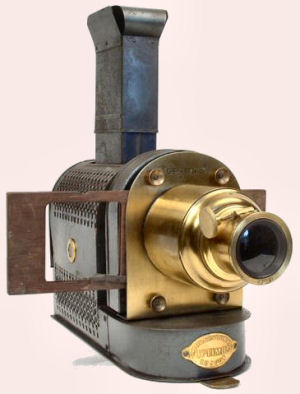 |
Large
magic lantern made by 'Optimus'. This large magic lantern is also made of blued metal and brass. The lamp house is ornamented using a pattern of small holes and has a small window with red coloured glasses on both sides. The base is a tank that contains the oil. The 3-wick oil lamp is connected to the tank. The chimney rises above the lantern through a rectangular opening in the roof of the lantern. The lens can be focussed by means of a small cogwheel. A small shield with the name of the manufacturer is placed in the front of the base and also on the back door. |
|
|
Optimus is a trade name of the English manufacturer Perken Son & Co., London. |
||
|
The maker of this magic lantern is the Danish manufacturer Kongsbak & Cohn, Copenhagen.
The original lighting is replaced by an electric lamp, as is unfortunately rather usual nowadays. The large lantern measures 50 cm long. |
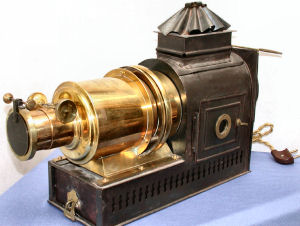 |
|
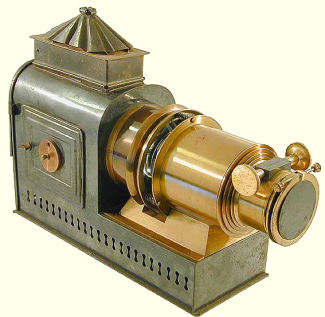 |
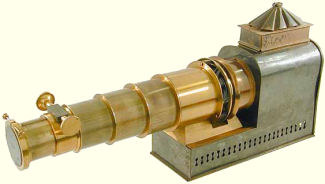 |
|
|
This large magic lantern has been
made by Walter Tyler and has a optical system that contains of no less
than six telescopic extensible parts. On account of the very large focal
distance of the lens this lantern was suitable for use in large rooms. |
||
|
Large, black painted magic lantern made by an unknown
manufacturer. Parts of the lens and the lens holder are plated with
nickel. The back door is hinged upwards and can be secured by a small rod. The box 'Gekleurde Lantaarnplaten' beside the lantern contains the fairy tale of the Wolf and the seven Goats. The base of the lantern is 39 x 14.5 cm. |
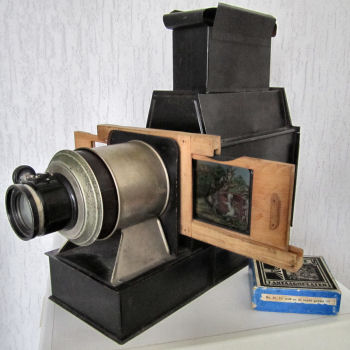 |
|
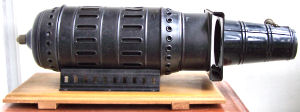 |
Torpedo shaped magic lantern, marked ERKO, c. 1920, Dutch? Trade name and logo are printed on the lamp house. | |
|
Suitable for a wooden slide
carrier for slides measuring c. 8 x 8 cm. Lens uses a rack-and-pinion
system for focussing. Socket for an electric bulb inside Mounted on a wooden base. Sizes c.: long 57 cm, wide 13 cm, tall 16 cm. Base 19 x 40 cm. |
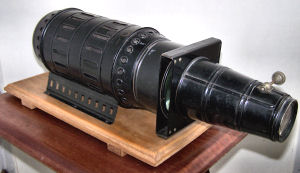 |
|
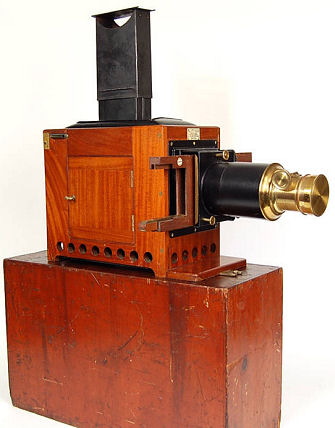 |
While continental magic lanterns
are nearly always made of metal, English magic lanterns are very often
made of shining mahogany, the interior covered by metal shields because
of the fire risk. Between the wooden lamp house and the metal casing was
some room for the cooling. This beautiful lantern is made by the manufacturers Newton & Co. from London. The company also produced many magic lantern slides. 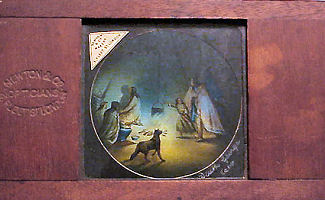 |
|
| Select another sort of magic lantern by clicking one of the images below: | |||||
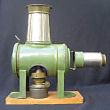 |
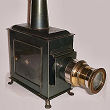 |
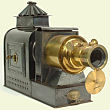 |
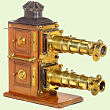 |
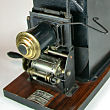 |
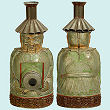 |
| |
©1997-2021 'de Luikerwaal' All rights reserved. Last update: 10-05-2021. |
|